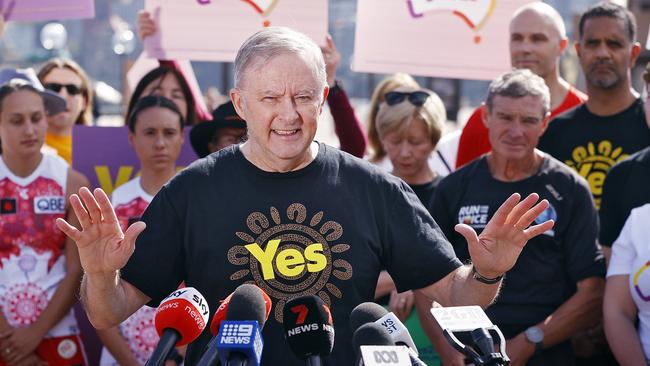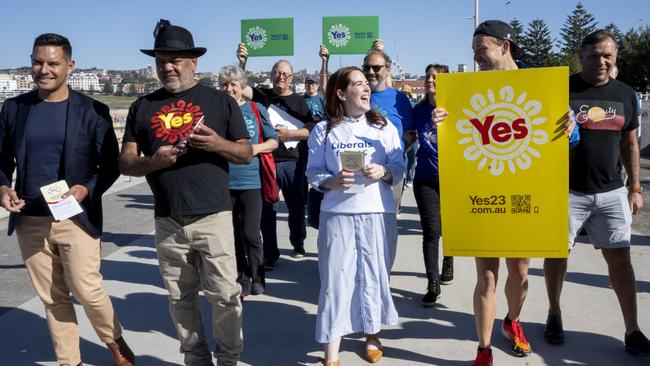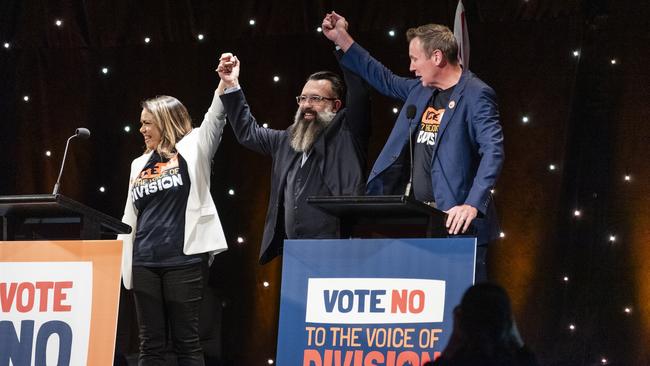Low voter turnout looms as critical deciding factor in Voice referendum
Forget reasons to vote for or against the Voice, both sides of the referendum campaign are grappling with an even more fundamental question, Clare Armstrong writes.

Opinion
Don't miss out on the headlines from Opinion. Followed categories will be added to My News.
Forget reasons to vote for or against the Voice, both sides of the looming referendum campaign are grappling with an even more fundamental question: will Australians actually show up to the ballot box?
As the cashed-up wings of the campaigns prepare for a frenetic sprint to the soon-to-be-announced October finish line, voter turnout is emerging as a major potential complicating factor.
There is a growing belief among some pollsters, political observers and campaign insiders that the large cohort of so-called “soft” voters may ultimately choose to spend their Saturday doing anything other than turning up to lodge their ballot paper.
This suspicion totally flies in the face of history, which has shown Australians have been consistently more motivated to turn up to polling stations at referendums than general elections.
The 1999 republic referendum enticed a whopping 95.10 per cent of the enrolled population to pick up a pencil and write “yes,” or as it turned out “no,” on their ballot papers.
That’s a bigger showing than any federal election in the last twenty years, with the 2022 showdown between Anthony Albanese and Scott Morrison drawing in a mere 90 per cent of enrolled voters.

But even that figure is significantly better than the recent showings at by-elections – traditionally a trickier event to inspire voters to sharpen their pencils.
In April this year the Aston by-election in outer suburban Melbourne garnered a turnout of just 85.6 per cent, but this was a positively outstanding result compared to just last month on the Gold Coast when a mere 72.54 per cent of voters fronted up to pick a new member for Fadden.
And yet it’s these lower by-election numbers that some pollsters expect could be repeated for the Voice referendum.
This is in large part due to one of the major problems both sides of the campaign have been grappling with: apathy to the cause.
The no campaign has so far proven itself far more adept at whipping up the conservative base into unwavering opponents of the Voice proposal, while yes organisations are yet to punch through the national consciousness.
But given many “soft no” voters sight a lack of understanding of the Voice as a key driver of their opinion, it is not clear how many will actually go out and register their opposition formally.
Internal research commissioned by those closely following the referendum debate has consistently detected confusion, even anger as to why this issue is being thrust upon the public at a time when so many other pressing issues are impacting their lives.
Are these voters also likely to rush out the door to get their names checked off on polling day?
And even though there will be many people who show up to avoid the fine for skipping a compulsory vote, once in the privacy of their voting booth there is no obligation to write anything on the piece of paper at all.

So what does this mean for the campaigns?
Well a referendum is only a majority of the people who voted, so if there is lower turnout, the raw number of people required to win a critical state is naturally reduced.
In a populous state like NSW or Victoria this could spell trouble for a yes campaign in need of a national majority.
While in smaller states like South Australia and Tasmania – both widely seen as must-win jurisdictions for the referendum to have half a chance of succeeding – 10 per cent less turnout could shave much-needed numbers from either camp if the race is close.
Research is generally showing about 25 per cent of Australians aren’t yet even aware of the impending referendum.
Lack of awareness is importantly distinct from lack of understanding.
Voters who know a referendum is coming or that a proposal called the Voice is being debated in public, but do not understand what it is, have essentially had a negative introduction to the idea.
From the yes campaign’s perspective, at best that’s simply because being confused is never fun, and at worst that’s because the only thing a voter has heard about the Voice is messaging from the no camp disparaging the lack of detail around the proposal.
These potentially undecided or soft voters will be much harder work for the yes to turn around.
But the large cohort of Australians who have genuinely no idea a referendum is coming down the pipeline are where the two campaigns will have the biggest fight on their hands.
A multimillion-dollar yes campaign will be pitted against a not quite as multimillion-dollar no campaign, with both competing to have their sides of the debate the first thing voters hear about the Voice.
But then will come the tricky part – actually getting any of these very busy Australians to turn up and vote.
Look out for US-style get out the vote efforts in the final weeks of the campaign to see just how worried either side is about getting their supporters to show up on the day.





